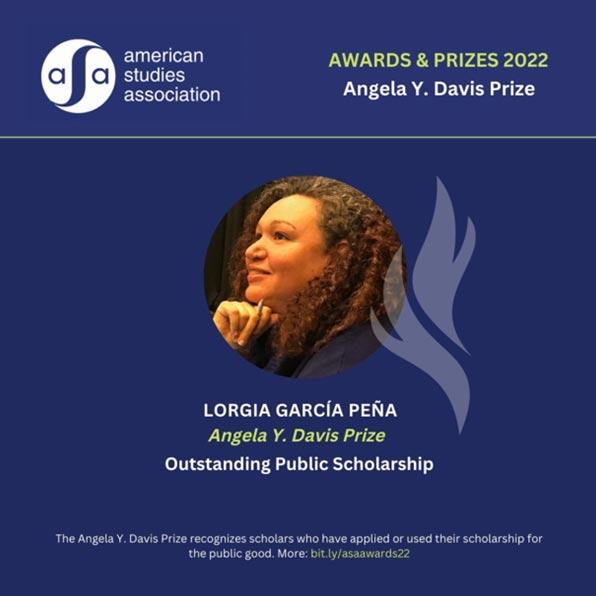Lorgia García Peña receives The 2022 Angela Y. Davis Prize

As a scholar whose work engages the fields of Ethnics Studies, Black and Caribbean Studies, Latinx Studies and American Studies, Professor Lorgia García Peña has an impressive record of award winning research, interconnected public engagement and dynamic mentoring practices. She has also sustained a commitment to activism across multiple sites from her foundational work in building Freedom University as an alternative educational space for undocumented scholars in Georgia to her collaborative Archives of Justice, a transnational digital humanities research and teaching project. This type of generative and generous scholar-activism makes García Peña's a fitting exemplar of the Prize's emphasis on "scholarship for the public good" and scholars who work "to educate the public" and "address inequalities in imaginative, practical, and applicable forms."
Professor García Peña is the author of The Borders of Dominicanidad: Race, Nation, and Archives of Contradiction (2016), which was awarded the 2017 National Women's Studies Association Gloria E. Anzaldúa Book Prize, the 2016 Latino/a Studies Book Award, and the 2016 Isis Duarte Book Prize in Haiti and Dominican Studies. Just this year she has published two additional books, the field redefining Translating Blackness: Migrations of Latinx Colonialities in Global Perspective and Community as Rebellion: A Syllabus for Surviving Academia as a Woman of Color, an invigorating call to action and radical challenge to the institutional status quo.
In addition to her critical scholarship, Professor García Peña puts her research to work in ways that reach a broader public. This has included an Op-Ed in the New York Times decrying the removal of citizenship rights for undocumented Haitians in the Dominican Republic and a Boston Review piece on "Decolonizing the University" as well as "expanding the conversation around Ethnic Studies writ-large through events and symposia" and mentoring a new generation of Ph.D. students. In all of these ways, Professor García Peña's intellectual and political investments have had a robust life beyond the university and the circulation of her books.
The capaciousness of García Peña's innovative transnational and interdisciplinarity scholarship and her rootedness in and responsiveness to the communities in which she is teaching and living, puts into action investments in creating "a more just world." This work is also grounded in, what numerous letter writers have noted as, García Peña's fundamental commitment to a "radical practice of care" both "within and beyond" the limits of the university. Lorgia García Peña is a scholar-activist able and willing to confront the challenges of our moment, and it is with great pleasure that the committee awards her the American Studies Angela Y. Davis Prize.